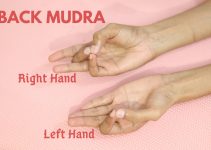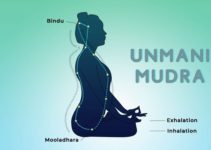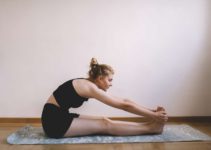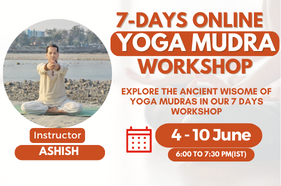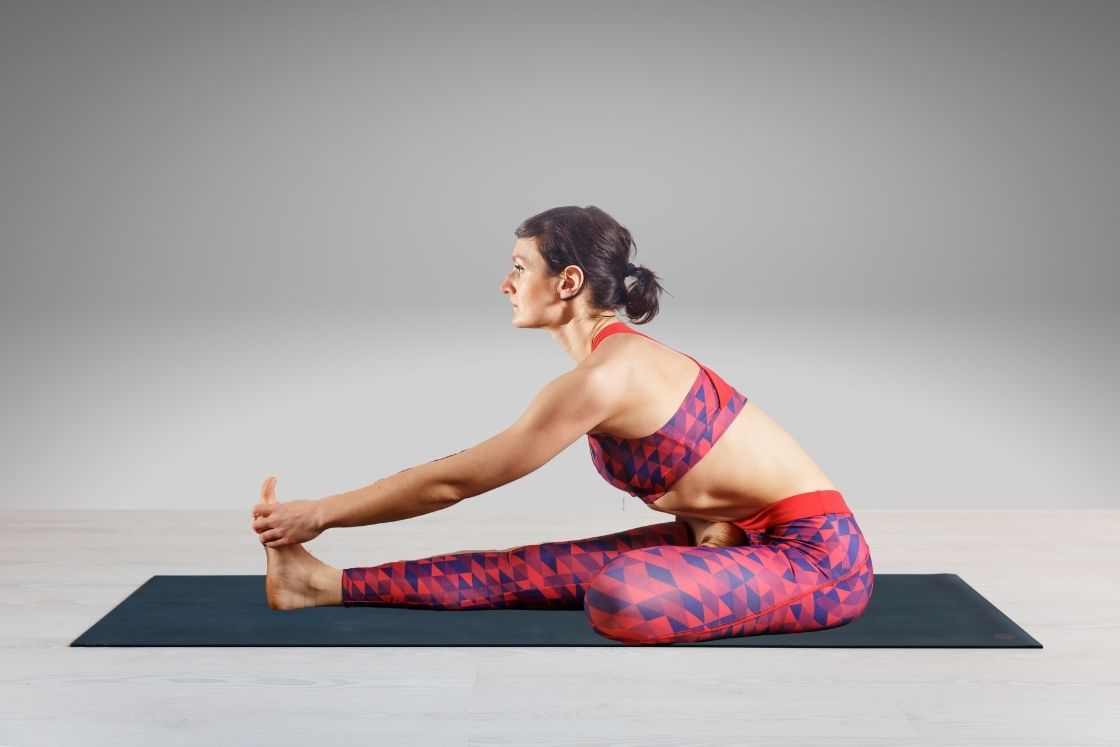
Maha Mudra, often written as Mahamudra, is an advanced practice of the Hatha Yoga in which all three bandhas Jalandhara, Uddiyana, and Mula applied at one time.
Ancient yogis used to perform this to create a surge of pranic energy inside the body for kundalini awakening.
Unlike other mudras in yoga that are mostly hand-based practices, Maha Mudra is a type of Bandha Mudra (lock gesture). In this type of mudra, the top and bottom opening of the trunk is locked or sealed by applying Bandhas so that no pranic energy can release from the body.
Mahamudra: Great Psychic Attitude or Great Gesture
Mahamudra is translated as great seal or great psychic attitude or great gesture. It’s called so because it’s performed as the combination of many yoga practices and so it combines the benefits of many individual’s practices.
In Maha Mudra,
- At the very first step, an asana is performed in which one foot is pressed against the perineum
- The trunk is bent forward
- Next, with internal breath retention (Antar Kumbhka) Mula bandha is applied
- Then, the Uddiyana bandha is applied
- Then by bringing chin to chest, Jalandhar bandha is applied
- Finally, at the end of Jalandhar bandha, Shambhavi mudra is performed to deepen the Mahamudra process.
As you can see, there are almost all practices including Asana, Pranayama, Bandha, and Mudra combines in the Mahamudra process. It makes this a great psychic attitude or great gesture in yoga. However, sometimes it’s referred to Mahamudra asana, as a pose.
Maha mudra with ten other mudras in Hatha Yoga Pradipika (treatise of Hatha Yoga) is said to destroy old age and death.
Mahamudra mahabandho mahavedhascha khechari
Uddiyanam mulabandhas cha bandho jalandharabhidhah
Karani viparitakhya vajroli saktichalanam
Idam hi mudradasakam jaramarananasanam.
Maha Mudra, Maha Bandha, Maha Vedha, Khechari, Uddiyana, Moola Bandha, Jalandhara Bandha, Viparita Karani Mudra, Vajroli, and Shakti Chalana, truly these are the ten mudras which destroy old age and death.
– Hatha Yoga Pradipika 3.6 & 3.7
How to Do Maha Mudra (Steps)
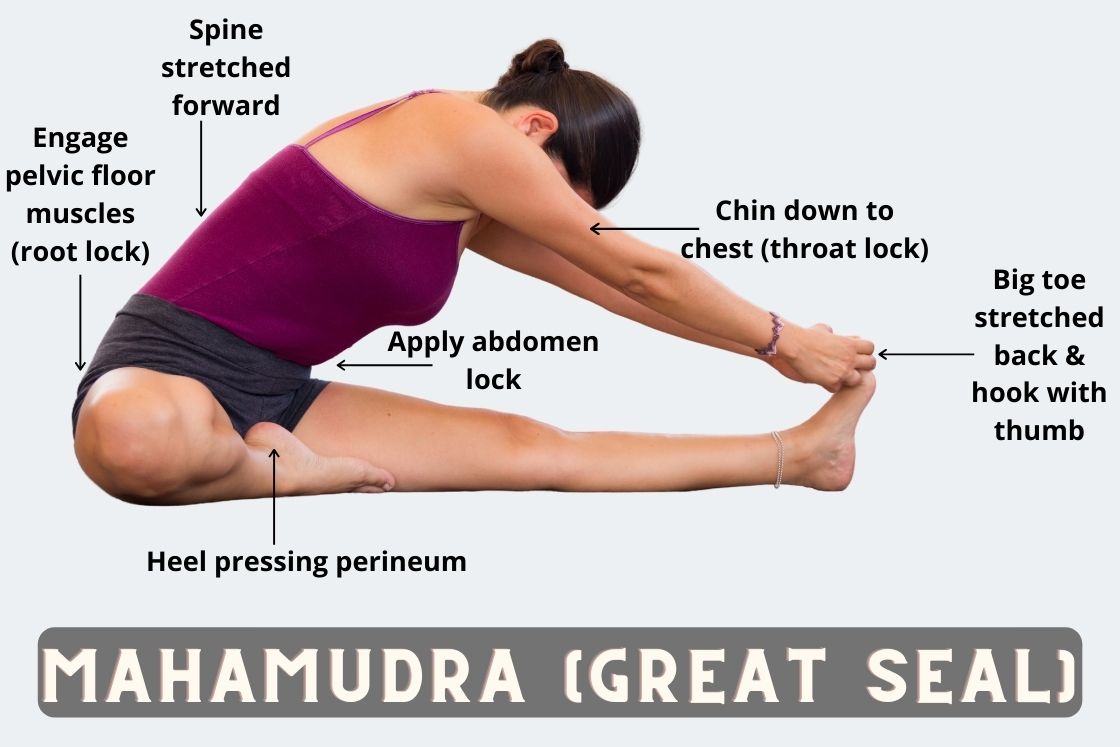
- Begin with sitting in dandasana. Extend your legs straight in front.
- Place both the hands on the floor by your side and straighten your spine.
- Inhale deeply and gradually fold your left foot drawing the left heel towards the perineum.
- Exhale and rotate your left knee to let in touch the floor.
- Inhale taking the hands off the ground and stretch them overhead.
- Exhale bending forward to grasp the big toe of stretched right foot keeping the spine straight and head erect.
- Inhale gently and bring your head to the collar bone and fixing the eyes on the center of the eyebrows.
- Stay in the pose holding the breath in for 8-10 seconds.
- By holding the breath bring your awareness to the bandhas. Practice the Mula bandha by contraction of pubic and coccyx bone. Then, the Uddiyana bandha by holding the breath and pulling the navel deeply in.
- Not letting the air escape out of the lungs contracts the throat muscles and exercises Jalandhara bandha.
- Exhale, and release the bandhas in reverse order.
- Inhale, bring your head up and come up stretching your arms overhead.
- As you exhale bring your hands to the floor.
- Inhale and stretch your left leg out. Rest in dandasna for a few breaths.
- Repeat the practice with folding the right foot.
How Does Maha Mudra Works?
Creating pressure at the bottom of the spine (where Kundalini lies in a dormant state) and then pumping this energy up by various means is the working mechanism of maha mudra.
In the practice of maha mudra,
- Perineum, which is the place of sexual potent and close to Muladhara chakra, is pressed with a heel. This stimulates kundalini energy in the root chakra.
- In the next step, we close the upper opening (throat) by attaining Jalandhar bandha and now even more pressure is exerted on the kundalini energy at the bottom.
- Then Uddiyana bandha is applied by tucking the abdomen wall inward to the spine and up towards the diaphragm. This process creates an imaginary suction tube for the kundalini energy to rise upwards.
Now kundalini energy instead of traveling from the Ida and Pingala Nadi enters into the Sushumna (the middle passage) because it’s a short and straight path for energy flow.
When kundalini starts flowing through Sushumna Nadi, it starts piercing chakras one by one and finally reaches to third eye chakra. At this point in the final step of Maha Mudra, Shambhavi mudra is applied to concentrate between the eyebrows, on the Kundalini energy.
In this way, Maha mudra helps in kundalini awakening and with this, many siddhis come to a yogi.
Precautions & Contraindications
- Practice maha mudra only if you have an expertise in shambhavi mudra, khechari mudra, moola bandha, and kumbhaka.
- Avoid practicing it in the hot summers, as it generates heat in the body.
- Mahamudra should only be practiced after the asana & pranayama session and before meditation session.
- Always complete Mahamudra process by practicing it both left and right sides.
- Avoid maha mudra during pregnancy or menstruation.
- Do not perform it in case of any eye disorders like glaucoma.
- People with hypertension or heart diseases must avoid it.
- Avoid it if there is an inflammation in the back or abdominal muscles.
Preparatory poses
- Big Toe Pose (Padangusthasana)
- Supta Padangusthasana (Reclining Hand to Big Toe pose)
- Warrior I Pose (Virabhadrasana I)
- Utthita Parsvakonasana (Extended Side Angle Pose)
- Reclining Twist Pose (Jathara Parivartanasana)
Follow-up poses
- Great Piercing Gesture (Maha bheda mudra)
- Beating the Kundalini (Tadan kriya)
- Seated Forward Bend (Paschimottanasana)
- Bridge Pose (Dvipada Pitham)
Modifications and Props
- Cushion/blanket- Practice maha mudra by sitting on a cushion, or fold a blanket and sit on its edge to perform the mudra. This will ease the strain on the back.
- Yoga strap – Secure a yoga strap to the ball of the stretched feet. Rather than holding the toe, you can grab the strap to easily slip into the mudra with a straight spine.
- Block – Place a block/cushion/blanket under the folded knee to practice maha mudra. This will aid in practicing it if the knee is aching.
Maha Mudra Benefits
In Hatha Yoga Pradipika, Maha Mudra is said to be the destroyer of all 5 kleshas -which are the causes of suffering in the mortal world.
Here are some physical benefits that one can experience on performing Maha mudra regular practice.
1. Muscle strengthening
Maha mudra exercises the muscles of the shoulder, upper back, buttocks, thighs, and legs. It also contracts and expands the abdominal muscles. Therefore, it provides stronger and flexible muscles to the practitioner.
2. Prevents indigestion
It massages the abdominal organs which activate the digestive system. It eventually helps in the secretion of digestive juices and enzymes. It aids in better digestion also keeps the practitioner away from constipation or other digestive disorders.
3. Improves endocrine system
Maha mudra stimulates the internal organs like the liver, pancreas, kidneys, gall bladder, etc. Holding Mahamudra asana for a longer duration is really helpful for spleen ailments and enlargement of the prostate gland.
In nutshell, it activates the secretion of hormones at an appropriate level regulating the endocrine system.
4. Enhances immunity
The stimulation of the internal organs also includes the spleen. With its stimulation, the body’s immune system is also activated. It helps to prevent diseases to enter the body.
5. Improves reproductive health
The reproductive system also gets benefits from maha mudra. As the heel is pressed against the perineum the reproductive organs are activated.
It also relieves the menstrual pain or any health issue related to the ovary or uterus.
6. Enhances the respiratory system
The gesture involves the steps that expand the lung capacity. It enhances the efficiency of the lungs to store oxygen and hence improves the respiratory system.
Any respiratory ailment like tuberculosis, asthma, bronchitis can be cured by maha mudra.
7. Builds self-confidence
All the three bandhas, Mula (root lock), Uddiyana (abdominal lock), and Jalandhara (throat lock) are stimulated by maha mudra. It involves holding the breath that exercises all the bandhas. It provides various benefits to the body.
Benefitting the locks, it improves blood circulation and oxygenation to the brain, that enhances the consciousness and confidence.
8. Promotes mental health
Besides maintaining physical health, it relaxes the mind by relieving stress and bringing calm. Maha mudra helps in clearing mental blocks, prevents negative thoughts, improves memory, and concentration.
It maintains a balance between the sympathetic and parasympathetic nervous systems.
9. Spiritual benefit
It provides control over sexual energy and activates the kundalini. It spreads the energy throughout the chakra system. It helps in gaining spirituality.
Maha mudra relaxes the mind and brings increased consciousness. It prepares the yogi for meditation.
Final Words
Maha Mudra is one such practice in yoga which literally gives you every possible benefit of yoga, just by one Maha mudra practice alone. In the ancient texts, it’s mentioned to keep its practice secret and not disclosed to anyone because it should be practiced only after getting a certain level of proficiency in simple yogic practices.
